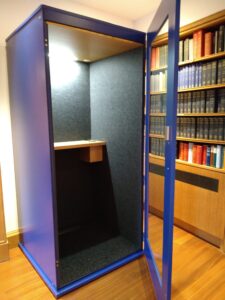 Phone Booth
Phone Booth
A new phone booth is now available for making and receiving calls in the Library. With power sockets to charge your phone or laptop it is also suitable for joining longer video calls or remote meetings. You can find it in the photocopier lobby. For longer or preplanned calls our bookable Basement Reading Room will once again be available from early 2024.
Christmas Vacation
The Inner Temple Library will close for the Christmas vacation on Thursday 21 December at 2.00pm. We will reopen at 9.00am on Tuesday 2 January.
The opening hours of all four Inns of Court over the Christmas vacation can be viewed on our website.
Saturday Opening
One of the four Inn Libraries is open from 10.00am to 5.00pm on each Saturday during the legal terms.
December
16 December Lincoln’s Inn
23 December CLOSED
January
6 January Gray’s Inn*
13 January Middle Temple*
20 January Inner Temple
27 January Lincoln’s Inn
* Please note change of order
This timetable gives the latest details of the Saturday opening of all four Inn Libraries up to the end of July 2024.
Library Catalogue Revamp
We have successfully migrated our Library catalogue to the SirsiDynix Enterprise platform.
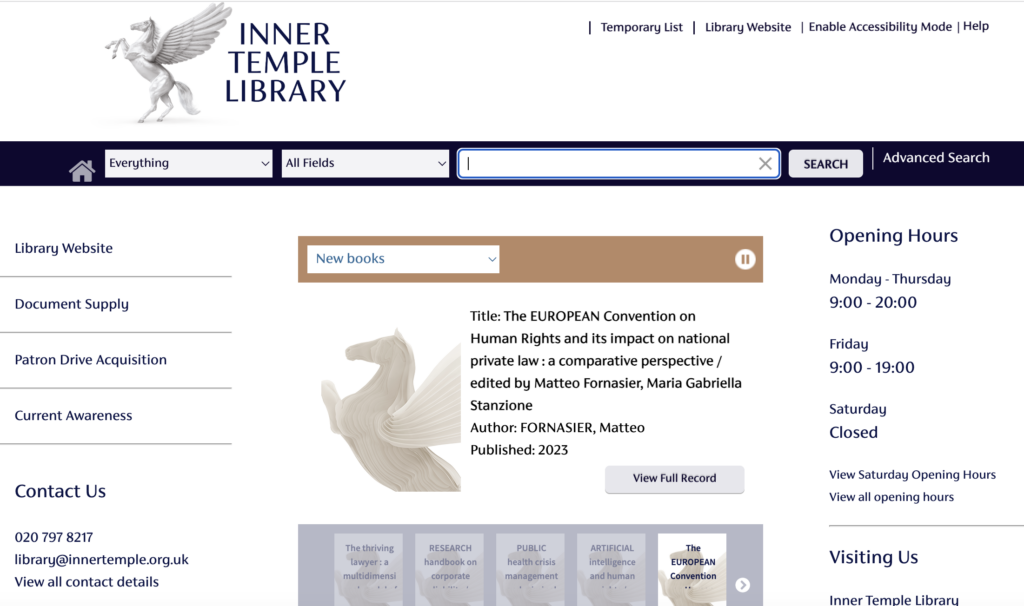
The catalogue now has a much more user-friendly interface, enabling you to navigate through our collections and manipulate results with ease.
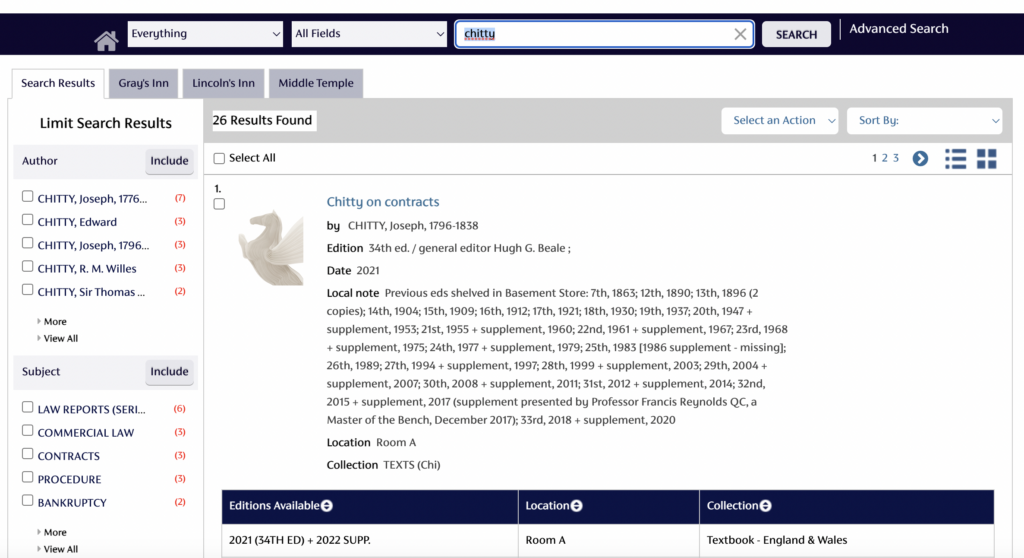
With advanced search functionality and filters to refine your results, discoverability is significantly enhanced. Additionally, the platform allows users to do more with their search results: these can be saved as a list and printed, or emailed to yourself.
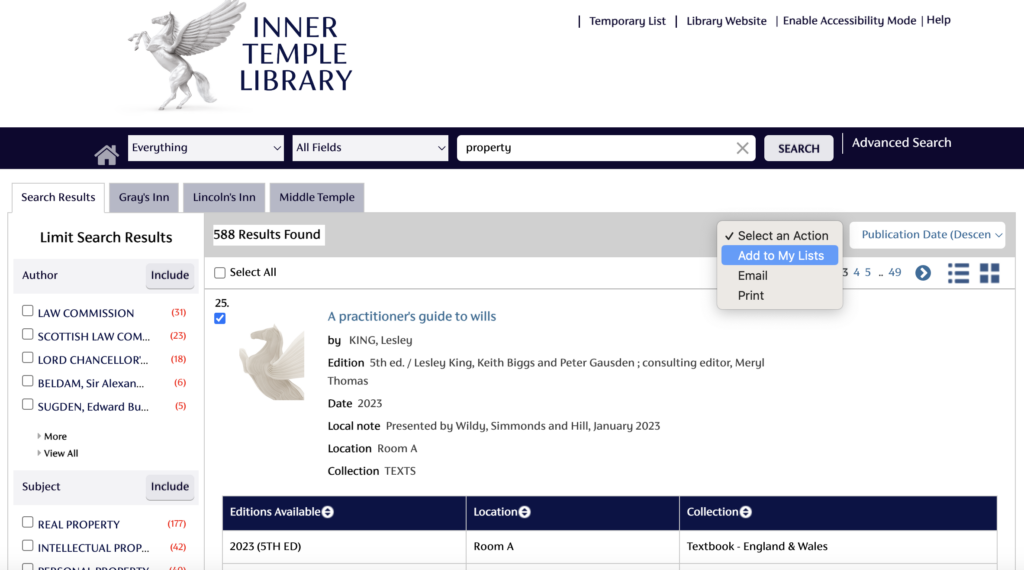
The increased ability to customise has also enabled us to highlight new titles (as well as recent additions to specific collections) on the front page of the catalogue, so you can browse new acquisitions.
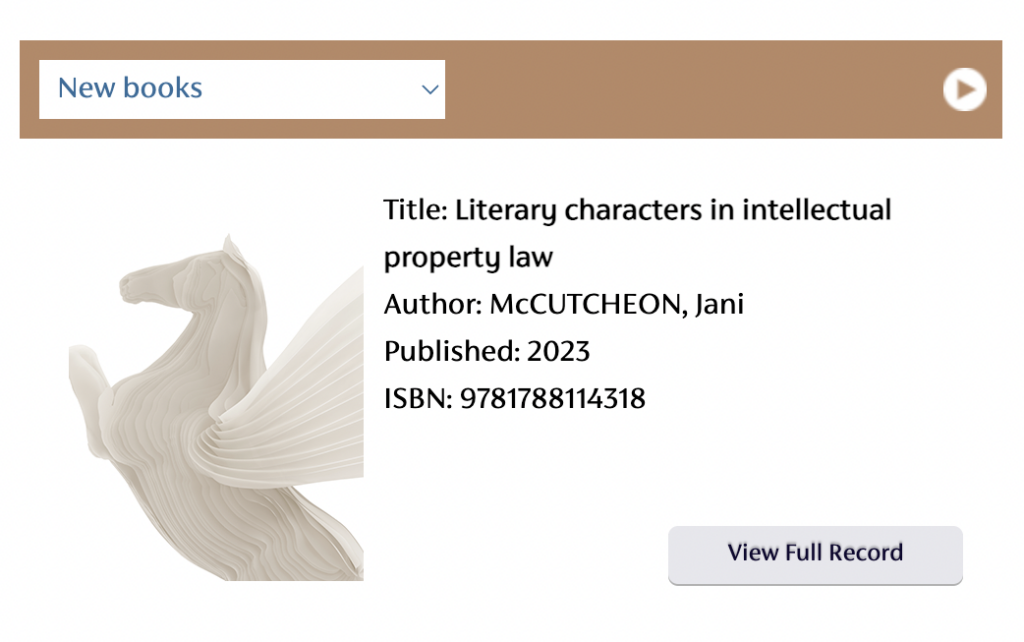
Library Guides
There are many guides available on the Library’s website. These will help patrons make best use of the Library and also assist in getting the best results from the subscription databases.
Guides are listed under Research and Training on the website.
The Readers’ Guide gives details of all Library services and information about opening hours and collections.
Database User Guides explain how to find what you need on Lexis+, Westlaw and vLexJustis. These are simple, straightforward guides on navigating your way around and easily locating essential materials.
If you prefer to have a training session from Library staff on the databases, please book a one-to-one session by contacting library@innertemple.org.uk or phoning 020 7797 8217.
The Library’s Commonwealth Collection – A Training Session
In November the Deputy Librarian gave a presentation to new pupils. This looked at the Commonwealth collections held by the Library.
The session described the special collections of the four Inn Libraries, particularly the Commonwealth collections held by the Inner Temple and Lincoln’s Inn. (The Inner Temple specialises in Canadian and Caribbean law, and Lincoln’s Inn in Australian and African law.)
The online and print resources that the Library holds were then considered.
With regard to online resources, Lexis+ International, vLexJustis and Westlaw Canada are the main databases to use in the Library.
Lexis+ International is found on the home page of Lexis+.

The International database contains materials relating to Australia, Canada, Hong Kong, India, Malaysia, New Zealand and Singapore.
The Library has access to some Caribbean material on Lexis+ but, as was explained during the session, this is found within the main Lexis+ database and not the International section. Additional Caribbean material on Lexis+ includes Eastern Caribbean Supreme Court Reports, West Indian Reports and Bahamas Law Reports. These are found using either the Search Sources or View All Sources tabs. Westlaw Canada contains cases and legislation, both federal and provincial. The reports on the database are Westlaw reports and do not correspond to published law report series. However, the database does give references to the published reports, many of which are held in the Library.
vLexJustis includes Bermuda Law Reports and Cayman Islands Law Reports as well as a very extensive collection of other Caribbean case law.
With regards to print holdings, it was explained that current materials are found in Rooms E, F and G. These collections are arranged alphabetically by jurisdiction. Older superseded materials are located in the Littleton basement and can be collected by staff.
Apart from the subscription databases the session also looked at some excellent free resources such as the Globalex guides and the Legal Information Institutes. Globalex guides are useful starting points for researching a country’s legal resources. Quality sites are referenced, and the guides are updated regularly. The Globalex homepage is at www.nyulawglobal.org/globalex.
Legal Information Institutes (LIIs) have been created for many jurisdictions including Canada, Australia, South Africa, New Zealand and India. They aim to provide free access to primary legal materials and can be a good place to undertake research if you cannot access the subscription databases.
The session was well received, and we would be happy to repeat it if there is a demand.
New Acquisitions
The contributors to Artificial Intelligence and Human Rights (Oxford) explore the effects of AI on both the concept of human rights and on specific topics, including civil and political rights, privacy, non-discrimination, fair procedure, and asylum. Second- and third-generation human rights are also addressed. By mapping these relationships, the authors clarify the benefits of and risks to human rights as new AI applications are designed and deployed.
James Thornton, in Criminal Justice in Austerity: Legal Aid, Prosecution and the Future of Criminal Legal Practice (Hart) offers a timely and detailed examination of the reality of criminal legal practice today. Drawing upon extensive anonymous interviews with criminal lawyers in England and Wales, he illuminates how financial pressures arise within the criminal justice system and how lawyers seek to withstand them.
The publishers state that The Law of Property Damage by Howard Palmer KC and others (Bloomsbury) is the only practitioner’s guide to this area of law. The authors provide analysis of the legal principles and practical concerns in claims arising from fire, gas, natural hazards, escape of water, subsidence, party walls and pollution, as well as discussing claims under the Defective Premises Act and the Consumer Protection Act. Mr Palmer was kind enough to present us with a copy of the book.
Neurolaw in the Courtroom, edited by Hannah Wishart and Colleen Berryessa (Routledge) brings together interdisciplinary perspectives to discuss the use and relevance of neuroscience at trial, and how neuroscience is currently benefiting and impacting upon vulnerable defendants in global criminal trials. Key issues covered include vulnerable defendants and the pre-trial process; the trial process; the use of neuroscience as expert evidence at trial; and mitigation of sentence with respect to vulnerable defendants.
We are grateful to the following (in addition to Mr Palmer) who have presented copies of new titles and editions to the Library in recent months: William Day for Key Ideas in Commercial Law and for Landmark Cases in Private International Law; The Hon. Mr Justice Ivor Archie, Chief Justice of Trinidad and Tobago for the first five Distinguished Jurist Lectures, published by the Trinidad and Tobago Judicial Education Institute; Master Adrian Saunders for The Caribbean Court of Justice: The First Ten Years; and Master Simon Heptonstall for Conley, O’Barr and Riner’s Just Words: Law, Language and Power, 3rd edition.
A list of new law titles and editions received from October to December is available.
Napoleon at the Inner Temple Library
James, Senior Library Assistant, writes
Inspired, after watching the somewhat criticized new Napoleon film by Ridley Scott, I tasked myself to find in the Library collections contemporaneous accounts and publications relating to the life of Napoleon. I highlight five such items below.
The Trial of John Peltier, Esq. for a Libel against Napoleon Buonaparte, 1803
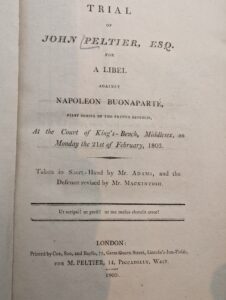
Collection: Trials. Available at the Enquiry Point.
This book concerns a libel trial in the Court of King’s Bench on February 21, 1803. Peltier was accused by the French government of publishing libellous materials in France against Napoleon, then first consul of the French Republic. We see an unflattering depiction of Napoleon on an Egyptian-style cartouche, with the acronym of the Roman Republic (later Empire), SPQR, emblazoned below.
The author fumes, “Already, in his insolent rage, the despot … dares to menace; but the foaming wave of the sea breaks itself against a rock. Is it to give you a master – is it to crown a traitor … that France has punished her kings? No, no, guilty ambition shall know, that there is nothing inviolable but the rights of the people and their laws” (p. 8)
The trial did not go well for John Peltier. “The Jury, without retiring from their Box, immediately returned a verdict of GUILTY.” (p. 208). Even so, Peltier, undeterred by the judgment, later in 1803 published the book as his own address to the public.
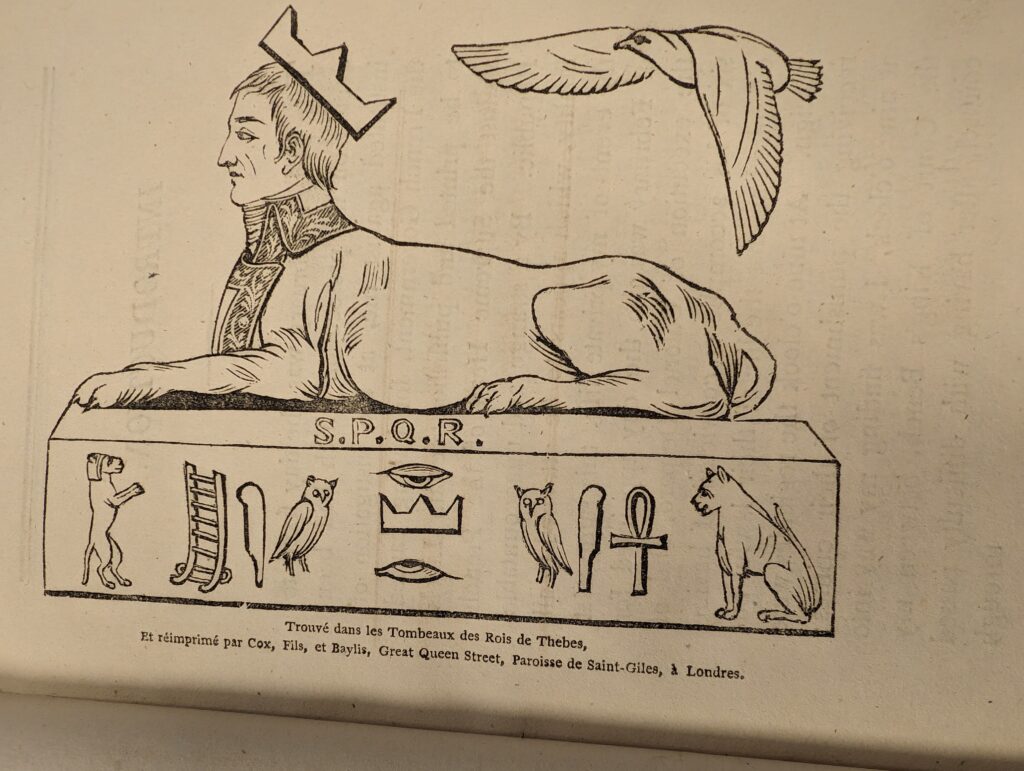
Narrative of the War in Germany and France, in 1813 and 1814. By Lieut.-General Charles William Vane, Marquess of Londonderry
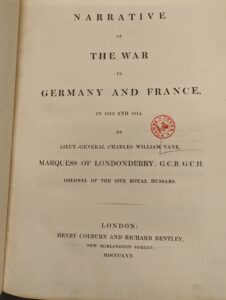 Collection: History. Available in the Littleton Basement. Apply to staff.
Collection: History. Available in the Littleton Basement. Apply to staff.
The events covered in this dense 19th century military work led directly to Napoleon’s eventual exile in Elba, which we will see later. The author, who is depicted in many portraits at the National Portrait Gallery, was one of the “foremost participants in the Napoleonic War and its political aftermath” (NPG) , and an eye-witness to the events described below.
One of the key battles in this period was the battle at Leipzig in October 1813, the lines of which are depicted in an illustration. In this battle the allies secured “a complete and signal victory on the 18th by the combined forces over Bonaparte, at the head of his army, in the neighbourhood of Leipsic.” (p.169). Napoleon was “fortunate to escape by rapid flight two hours before the entry into Leipsic of the allied forces.” (p. 169)
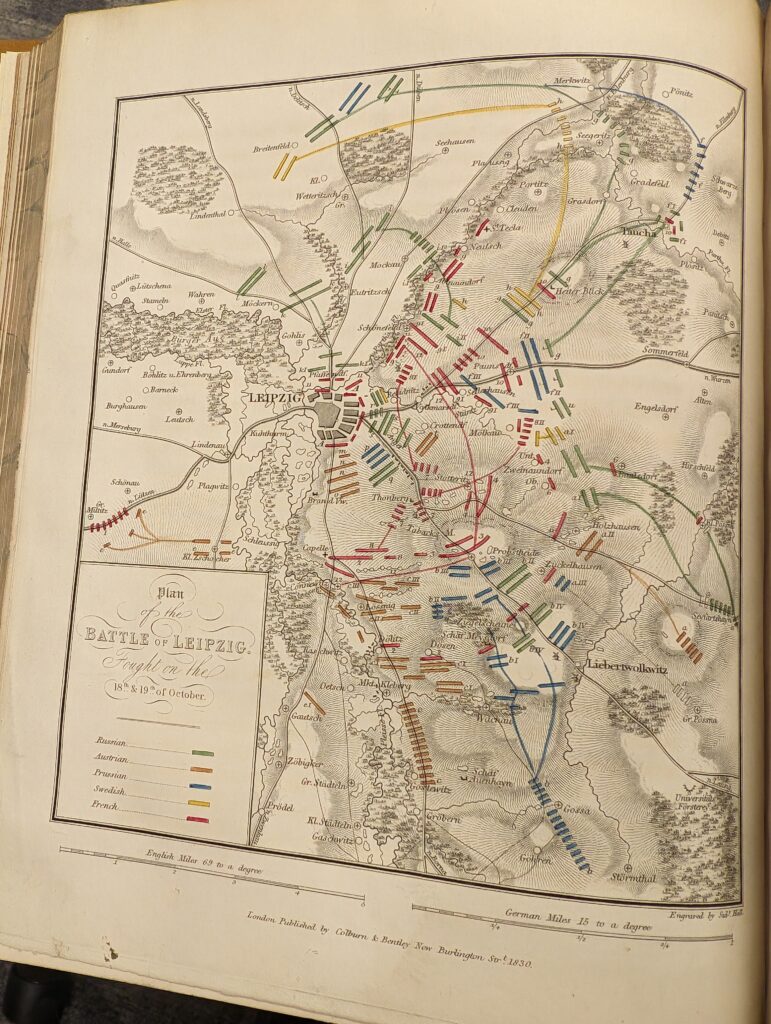
British and Foreign State Papers 1812-1814 Vol 1, Part 1
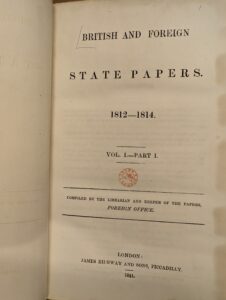 Collection: Treaties. Available in the Littleton Basement. Apply to staff.
Collection: Treaties. Available in the Littleton Basement. Apply to staff.
This is a fascinating series, covering the years 1812 to 1968, compiled by the Librarian and Keeper of the Papers of the Foreign Office. It contains contemporary diplomatic correspondence, as well as copies of treaties that the British government were a signatory to, or were involved with.
The treaty between Austria, Prussia and Russia and Napoleon, signed in Paris on April 11, 1814, relates to Napoleon’s exile to Elba and the terms agreed upon for Napoleon and his family.
Stipulated in the treaty, as translated into English, is that “the annual pension of the Empress Josephine shall be reduced to 1,000,000” and “she shall continue to enjoy, in full property, all her private property”. With respect to Napoleon himself it is stated, “the funds … which His Majesty abandons to the Crown, there shall be reserved a capital, which shall not exceed 2,000,000” (p.138). Some criticism of Scott’s film has concerned its historical inaccuracies, but both these clauses made it into the theatrical cut.
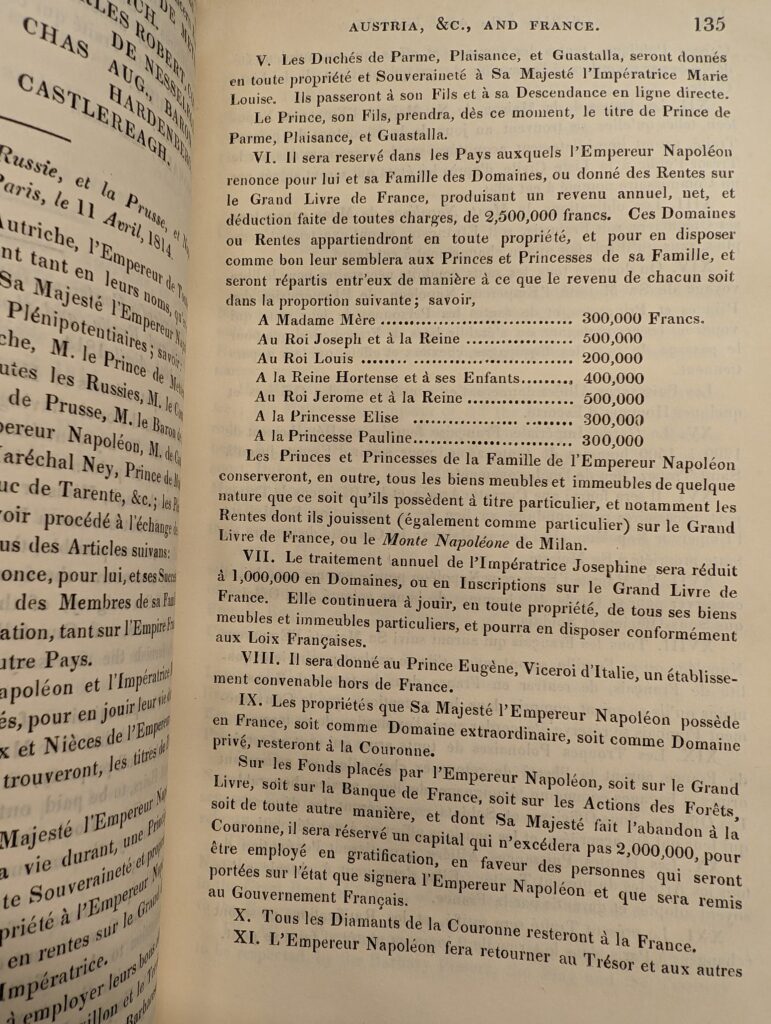
Cobbett’s Parliamentary Debates, Vol XXXI: May 2-July 12 1815
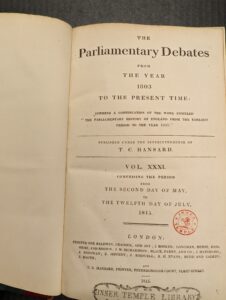 Collection: Parliamentary Papers. Available in the Littleton Basement. Apply to staff.
Collection: Parliamentary Papers. Available in the Littleton Basement. Apply to staff.
These debates, published from 1804 to 1820, were the precursor to Hansard’s Parliamentary debates; indeed it is noted on the title page as being published under the supervision of T. C. Hansard. We see here extracts from speeches given in the House of Lords on Friday June 23, 1815, in which the Lords gave “Thanks to the Duke of Wellington, Prince Blucher and the allied armies” in relation to the victory over Napoleon at the battle of Waterloo.
Earl Bathurst, the first to speak, “rose … to move the Thanks of the House to the Duke of Wellington , and the army under his command, for the transcendent exertions which led to the victory of the 18th of this month” and he goes on to exclaim that Napoleon’s “boasted genius shrunk under the ascendency of the mightier genius of him by whom he was opposed and the result was the complete rout and overthrow of the French army.” (col. 971)
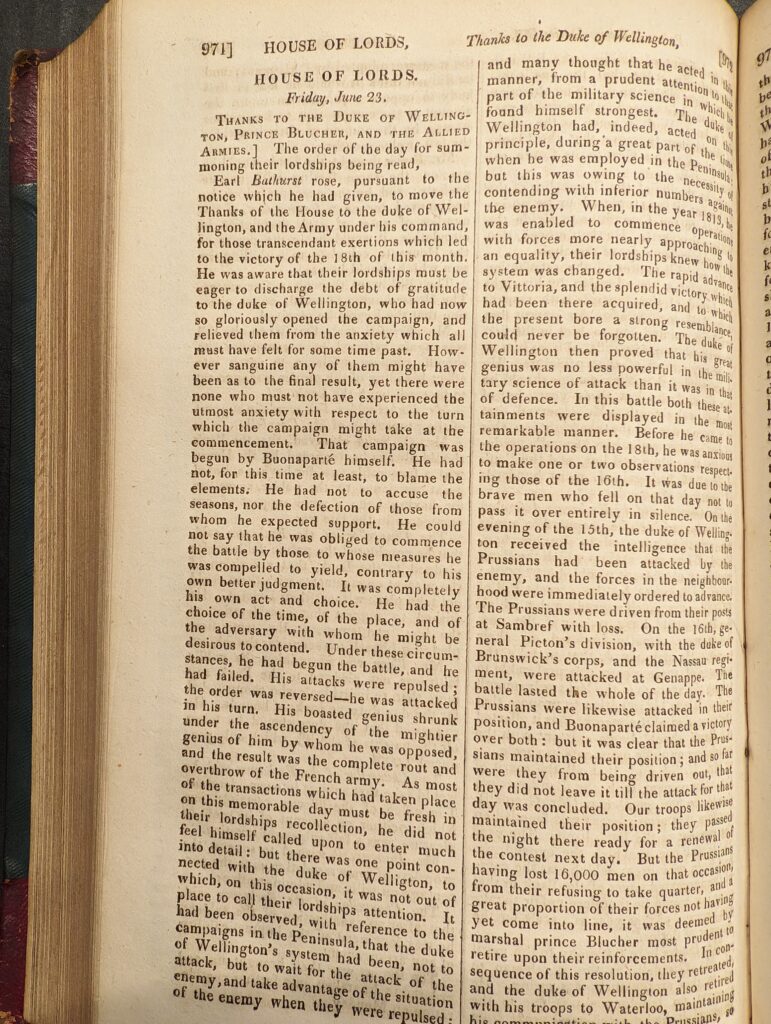
Narrative of the Surrender of Buonaparte, His Residence on Bellerophon, by Captain F.L. Maitland. 1826
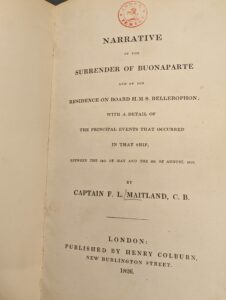 Collection: Biography. Available in the Littleton Basement. Apply to staff.
Collection: Biography. Available in the Littleton Basement. Apply to staff.
Our final item is an account by Captain Maitland of Napoleon’s time onboard the ship, HMS Bellerophon, on which (after his surrender) he was conveyed to Plymouth between May and August 1815.
This account was written some eleven years after Napoleon’s surrender and his subsequent exile on St Helena; the author notes that he didn’t publish this earlier, as “the … narrative was then written solely for the private perusal of my friends, and not with a view to publication.” (p.70)
The book has many fascinating details including a description of the clothes Napoleon was wearing when he surrendered; this encompassed the then (in)famous “uniform of the Chasseur à Cheval of the Imperial Guard” (p.70).
Later Captain Maitland recounts Napoleon’s reaction as he is informed that he will be sent into exile on St. Helena. “The idea of it is a perfect horror to me. To be placed for life on an island within the Tropics, at an immense distance from any land, cut off from all communication with the world and everything I hold dear in it! – c’est pis que la cage de fer Tamerlan.” (p.144)
We hope that you have enjoyed this quick delve into some of the Library’s more rarely seen collections. The books mentioned will be available for your perusal at the Enquiry desk until Christmas; and if there are any historic persons or events that you might have an interest in, please contact us and we can investigate if there is anything in our collections that might be useful.
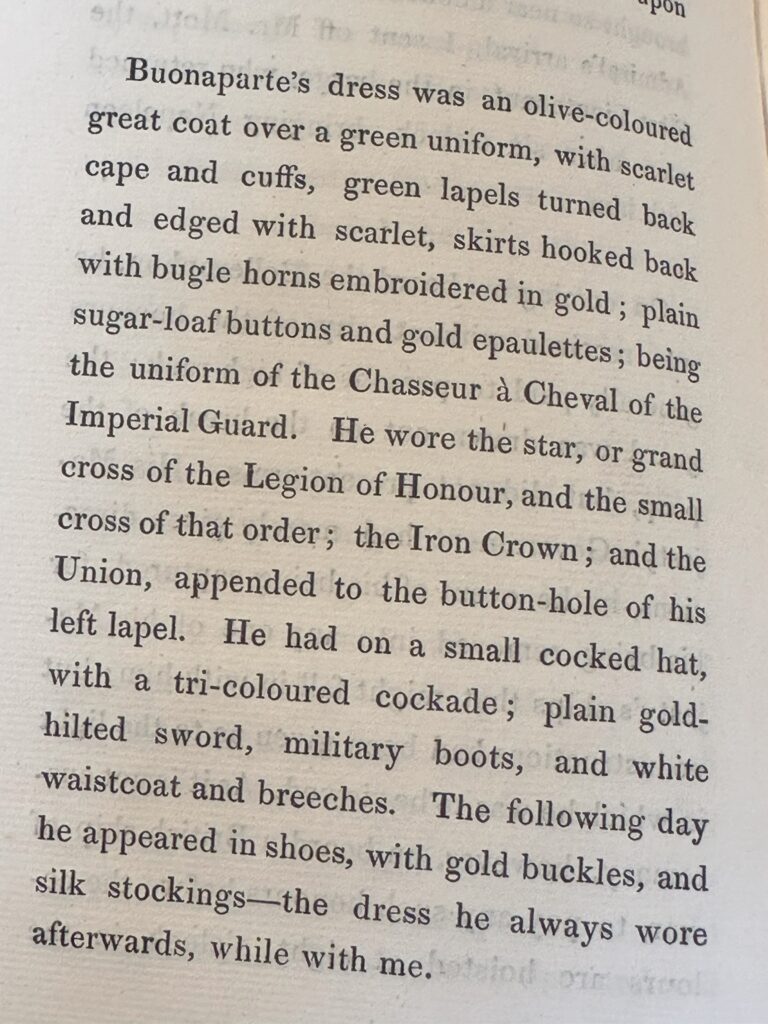
Staff Reflections
Tina, Library Administrator, writes
It has been an eventful year behind the scenes in the Library. As the Administrator I help Library staff and the Library be the best they can be. After six months of being back in the Temple towards the end of 2022, we began to look at what worked and what was needed to make the space even better for our users and what would help the staff in their roles.
New items were purchased including a shredder for the photocopying room, an ID protection identity erase-it stamp to remove confidential information from documents, more headphones for use in the Library, ladders that are easier to handle, a new hearing loop for the hard of hearing and other accessibility-related items that we will be advertising soon.
One major purchase is the new phone booth in the Photocopying Lobby. See page 1 for more information on this sought-after accessory.
During the fortnight we were closed in the summer we moved a great many books in order to make more room for growth, and we are still continuing to reorganise the Littleton Basement Store. Major works have just finished in the Basement Store in the main Treasury Building, and we are looking forward to having our stock back from storage and welcoming people back to the Basement reading room (which was closed for the duration of the works) in the new year.
We have been updating the way we use our office applications to get the best out of them and make our work easier. I streamlined the management of the Document Supply Service by putting everything into one new database, thus saving the duplication of work. After three months of using it and some minor tweaks, staff are happy that it works better than the old system and saves them time. We also started using MS Teams for sharing files and information, cutting down on email traffic and multiple copies of documents. I have digitised various documents in order to save on physical storage space and to cut down on the use of paper in future.
I feel we have made a lot of positive changes in the Library (for staff as well as users) and hope to continue these into 2024. Please let us have your feedback.
Tracey, Deputy Librarian, writes
We have been back on site in the Temple for nearly two years. I am now feeling at home in the refurbished space. We had to tinker with layout over the summer and now collections are in better spaces within the library. We made a silent zone in Room F as a result of user requests and it will be interesting to see if this decision was a good one.
I have been involved in clearing backlogs of re-shelving in the Littleton basement and organizing the materials in a more logical manner. I like things to be well organized, so this has been particularly satisfying, and an additional bonus is that the physical work means fewer trips to the gym!
I enjoy giving training sessions and this year I have been involved in some new ones. My colleague Simon and I ran a new qualifying session on official publications in the spring and I gave a presentation to new pupils about our Commonwealth holdings. We have carried out more one-to-one sessions this year and I have enjoyed these very much. Feedback suggests that this sort of session is very much appreciated by students.
I have also been asked to speak to groups of librarians (specifically on how to find Caribbean legal materials and also on collection management). It is always gratifying to be asked to speak to people outside of the Inns and particularly to other librarians.
All in all, a very busy but enjoyable year.
The Library Loves Feedback
We are always grateful for feedback. Please let us know what you think of the Library and its services by emailing library@innertemple.org.uk

